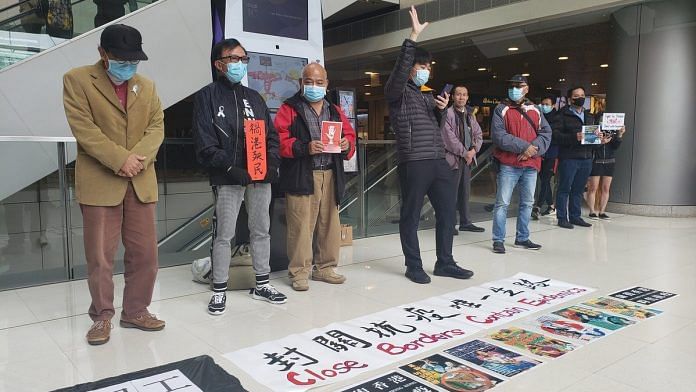New Delhi: With the coronavirus pandemic creating havoc across the globe and governments advising people to practise social distancing, many mass protests have been put on hold.
The virus, which began in China’s Wuhan city, has claimed more than 16,000 lives and infected over 3 lakh people across the world.
While advisories have been issued to avoid large gatherings in order to stop the spread of COVID-19, some demonstrators have also found newer ways of protesting without hitting the streets.
Meanwhile, many have defied government lockdowns and restrictions on movement.
Here is a look at how mass protests in New Delhi, Hong Kong and Chile have changed course following the COVID-19 outbreak.
Also read: Shaheen Bagh protest must end now. Its returns are diminishing and COVID-19 is a real risk
Shaheen Bagh comes to a halt
The months-long protest against the Citizenship Amendment Act in Delhi’s Shaheen Bagh came to a halt Tuesday morning after police cleared the site, two days after Section 144 was imposed in the national capital due to the coronavirus outbreak.
The protest had begun on 15 December last year and continued for nearly three months.
Protesters had previously defied government restrictions and Delhi Chief Minister Arvind Kejriwal’s order to ban mass gatherings over the spread of the virus.
Last week, a gathering of more than 50 people participated in a sit-in, with volunteers providing hand sanitisers and wooden benches set one metre apart to increase physical distance.
Hong Kong protests reduced to small flare-ups
When the first coronavirus case was detected in Hong Kong on 22 January, the pro-democracy protests in the territory were put on hold.
The demonstrations, against plans to allow the territory’s extradition to mainland China, have since been reduced to “localised, spontaneous flare-ups or strikes”.
While activist Joshua Wong, who is one of the main faces of the protests, has continued to urge people “not to give up” yet, many have appealed to people to stay indoors.
“At a time like this, instead of organising rallies, our priority is reminding people to protect themselves. Keeping ourselves alive is part of the resistance,” Ryan, a product designer, who is part of the Hong Kong Design Industry Union, was quoted as saying in a report in The Washington Post.
On 21 March, a 100-people protest to mark eight months of the mob beatings in Yuen Long district took place. But police used tear gas to disperse the crowds.
Even though the pro-democracy protests have been reduced in size and scale, the larger public discontent against the Carrie Lam administration remains.
Last month, hundreds of hospital workers in Hong Kong went on strike demanding a complete closure of the territory’s border with China to reduce the risk of coronavirus spread.
Mass arrests have also deepened discontent. The Hong Kong police arrested nearly 7,000 human rights observers, journalists and medics last month. The police has also been accused of using excessive force during a public health crisis.
Also read: US lawmakers nominate Hong Kong protesters for Nobel Prize
Chileans banging pots and pans against govt
The coronavirus has also dampened the Chilean protests against inequality and costs of living in the country.
The demonstrations, which began in October over a hike in metro fares, had spilled on to the streets with at least 30 deaths and hundreds of injuries. Protesters have demanded a rejig of education, health and pension systems in the country. One of their main demands has been a referendum for a new Constitution.
But with the COVID-19 outbreak, Chilean authorities Wednesday declared a “state of catastrophe”.
Chile President Sebastian Pinera has announced a “constitutional state of exception for a catastrophe” for 90 days. A state catastrophe gives military forces control over the movement of people.
The protesters have since resorted to noise demonstrations clanging pots and pans from their balconies.
Chile has so far recorded 238 confirmed coronavirus cases — the highest per capita figure in South America.
Also read: Almost 25 million jobs could be lost globally due to coronavirus, says UN body



